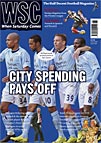 Having slid to the fifth tier Fortuna Cologne are looking to a web-based model to revive the club, explains Paul Joyce
Having slid to the fifth tier Fortuna Cologne are looking to a web-based model to revive the club, explains Paul Joyce
Under their dictatorial president Jean Löring, Fortuna Cologne were possibly Germany’s least democratically run club. Löring once fired manager Toni Schumacher at half time during a match in 1999 with the words: “I, being the club, had to react.”
So it’s ironic that Fortuna have become the first German side to follow Ebbsfleet’s example and give an internet portal, deinfussballclub.de (DFC), a say in the running of the club. For an annual subscription of €39.95 (£36), fans worldwide can vote on Fortuna’s promotion applications, player acquisitions and even beer prices. The scheme is supported by film director Sönke Wortmann, who has made two mawkish football films, and former German international Jens Nowotny, whom 78 per cent of fans voted to hire as a sporting adviser.
DFC is marketing the initiative as “the only football manager game that takes place on grass”. Up to 24 hours before a match, supporters submit their preferred team line-up and tactics. Trainer Matthias Mink can reject the formation chosen by the computer, but must then justify his decision in a web-chat. If at least ten per cent of Fortuna’s online “co-trainers” want to oust the coach, a vote is held on his future.
“Our first aim is to prove that football fans are able to run a club successfully,” says Burkhard Mathiak, DFC’s press spokesman. “We also want to help Fortuna Cologne return to professional football.” After 26 seasons in the second division, the 1983 German Cup finalists are now becalmed in the fifth tier
But doubts remain. At the launch of deinfussballclub.de in April 2008, it was stated that the scheme would begin when 30,000 people had signed up. Yet only 11,700 had registered when the first annual subscription became payable in February 2009. Despite complaints that fans had not been consulted on the decision, Mathiak claims DFC members themselves had wanted this earlier start, “although it turned out afterwards that it would have been financially difficult for Fortuna if our project hadn’t begun”. Some DFC participants declined to pay up – the counter on the website indicated only 10,437 members at the time of writing.
German club ownership regulations are a further disincentive. All clubs must own at least “50 per cent plus 1” of their shares, which means that DFC was only given a minority stake when Fortuna’s football section became independent from the main club in December 2008. Although the DFC website claims “You decide!”, Fortuna still hold the reins. Klub-der-Fans.de, the first German internet portal to launch a fan ownership project, has now ceased operations until this “50+1” rule has been amended.
DFC’s ownership structure is in itself problematic. Online fans sign a contract that merely grants them usage of the internet portal – which is owned by the two founders, Peter Josef Felden and Dirk Daniel Stoeveken, and an investment company, MWS Invest. According to the terms and conditions, the owners can sell the portal (and its stake in Fortuna) without the users’ consent. They alone – not the fans, and not Fortuna – profit from an increase in value in the company. The portal can also be closed down at any time without explanation.
“We want to make money with the project, no question,” Stoeveken concedes. Mathiak emphasises, however, that they would like a return on their investment only after Fortuna have regained professional status, arguing that “selling part of the company is a reliable means of generating additional funding”.
Sports lawyer Thomas Dehesselles has accused DFC of having an “intentionally misleading marketing strategy”, not informing portal users that they are neither members nor co-owners of the club, nor telling them that they are not entitled to a return on their investment. He also questions how democratic DFC really is. “The operator of the portal alone decides what gets voted on,” Dehesselles asserts. “And then he decides whether to implement the result of the vote.”
Yet Fortuna Cologne’s existing supporters have largely welcomed their new partners. With an average home crowd of only 1,024, many agree with club president Klaus Ulonska that higher-level football would be impossible without DFC investment, and have joined the portal themselves. The increased transparency in club affairs has rejuvenated fanbase discussions, although Fortuna vice-president Emmanuel Merkle was highly critical of DFC’s decision to inform the web community in March why defender Cedric Mimbala had been suspended. It remains to be seen, however, how long the enthusiasm of the internet fans will last if their new investment doesn’t climb the football pyramid straight away.
From WSC 268 June 2009